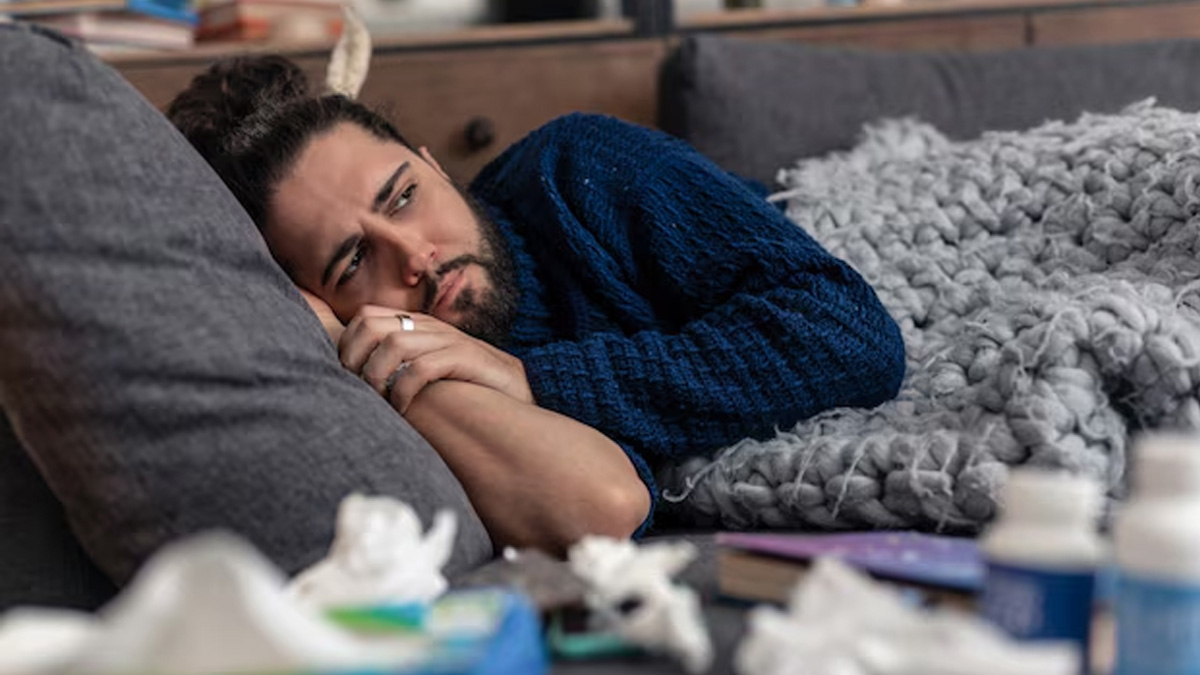
Falling sick is such a kick in the knee, as it thrashes away and washes over all your plans for the day. Obviously, no one likes falling sick unless it coincides with an exam or meeting you were especially concerned about. Other than that, bouts of illness like fever, cold, cough, body ache, or digestive issues, are bound to bring along a host of mental disturbances. However, the issue gets serious when these obvious and normal feelings become hard to shake off and leave you in a slump that further worsens your physical health.
Table of Content:-
To understand why some people feel extra depressed or anxious when they are sick, the OnlyMyHealth team spoke to Dr Sonal Anand, Psychiatrist, Wockhardt Hospitals, Mira Road.
Depression Is A Serious Disorder And Not Just An Emotion
Busting one of the most common mental health fads, Dr Anand first discerned that small grievances of life, like a cold or cough, which probably lasts for a maximum of 2-3 days, “does not cause depression.” She said, ”It can exacerbate preexisting mental health conditions. For example, if you are prone to anxiety, you have had anxiety disorder in the past, so definitely when you are a little low, you can have a little bit of an anxiety attack.”

However, when it comes to depression, that is just not the case. She said, “Mental disorders like depression do not last just for 2-3 days of a cold or cough. You don't really feel depressed. You can feel low because sickness causes fatigue, loss of appetite, or some other changes in the body. That’s a normal part of being sick. But what you are feeling can not be called depression.”
Feeling anxious, on the other hand, when mildly sick is very much validated. Turns out, the vice versa is also true. According to a study by Takakazu Oka published in the journal Temperature°, chronic stress or anxiety can also cause fever, and is labelled Psychogenic fever.
Chronic Illness: A Risk Factor For Depression And Anxiety
When it comes to prolonged illnesses like end-stage terminal diseases or severe pathogenic infection, Dr Anand said that these are big risk factors for depression or anxiety disorder. “It brings along this sense of hopelessness, worthlessness, financial strain, and frustration due to an excessive number of treatments and still not getting a cure or the kind of family support needed,” she explained.
In addition to these social or emotional risk factors, chronic illness also brings about physiological changes that may contribute towards depression or anxiety.
Lifestyle Disruptions During Illness
The feeling of inertia and hopelessness brought on by chronic or prolonged illnesses can contribute to mental health issues, especially if you couple it with physical and mental inactivity. “These mental health challenges during illness are exacerbated if you do not or are not able to (due to challenges like being on a respirator etc.) get back to your daily chores. For example, if you're at home most of the time, you're not working, and don't have a set timetable for your daily routine,” said Dr Anand. She elucidated that such a routine makes people feel less confident about themselves and can even cause severe depression and suicidal tendencies.
Depleted Production Of Happy Hormones
In addition to a disrupted and lethargic lifestyle, being sick also disrupts the production of feel-good hormones in the brain. “Hormones like endorphins, dopamine, oxytocin, and serotonin get reduced when you're not taking good care of your body or are sick,” said Dr Anand. According to Harvard Medical School, the depletion of feel-good hormones is further aided by a lack of proper diet, exercise, or mindfulness practices when you are sick.
Also Read: Anxiety Vs Anxiety Disorder, Experts Share A Comprehensive Guide About This Mental Health Condition

Managing Depression And Anxiety Due To Illness
If you have a mild fever and it is making you anxious, if you have a chronic illness that has paved the way to severe depression and anxiety disorder, or if you already had depression and anxiety and it is getting exacerbated after falling sick, Dr Anand listed a few tips that can help you cope:
- Plan a day-to-day routine and stick to it
- Try to get up on time
- Practice mindfulness activities like yoga or meditation
- Try to do some light physical exercise daily
- Do some mental exercises in the morning like crossword puzzles
- Have a hearty and healthy breakfast
- Foster a healthy family and friend support
- Avoiding reading negative news when you are scrolling through social media
- Have a hobby that makes you happy
Dr Anand concluded that while these tips may help you cope and understand what is going on inside your body, a serious bout of depression or anxiety needs to be checked out. Instead of self-diagnosing by looking at such content pieces on the internet, you should see a doctor who can help diagnose your problem, and provide a personalised plan to help you recover or cope with your illness.
Also watch this video
How we keep this article up to date:
We work with experts and keep a close eye on the latest in health and wellness. Whenever there is a new research or helpful information, we update our articles with accurate and useful advice.
Current Version